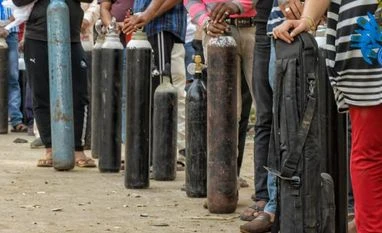Amid acute shortage of medical
oxygen due to a surge in coronavirus cases, vehicles and individuals are queuing up outside the BHEL's plant here to get the empty cylinders refilled with the life-saving gas.
Due to the rising demand, the Bharat Heavy Electricals Limited's Bhopal unit has been functioning round-the-clock to provide oxygen to citizens, an official said.
According to eyewitnesses, people are queuing up in large numbers to get the oxygen cylinders refilled.
"The queue of people and hospital representatives with cylinders is so long that they have to wait for 6-7 hours for their turn to come," one of the eyewitnesses said.
Talking to PTI on Saturday, Bhopal BHEL's general manager (PR) Raghvendra Shukla said its oxygen plant has been operating at in its full capacity of about 5,000 cubic metres per day since over a week following the state government's request.
"On April 10, we had told the state government that we can arrange only 1,800 cubic metres per day, but after the requirement increased, we have been running our plant round the clock in full capacity of more than 5,000 cubic metres per day starting April 18," he said.
More From This Section
Oxygen in the form of gas is being given in cylinders on the recommendation of doctors and hospitals at BHEL's facility here, Shukla added.
The production and supply at the BHEL plant is open round-the-clock so that people don't have to wait for long, he said.
According to him, BHEL Bhopal's entire production of oxygen is being supplied for medical purposes and its industrial use has been stopped.
"But recommendation of doctors is necessary as the campus has been secured by the Central Industrial Security Force (CISF) staff, and it is needed for entry," he said.
Meanwhile, the state government said in a statement that the Centre has approved the supply of 643 metric tonnes (MT) per day oxygen supply from April 22.
On Thursday, the state was supplied 463 metric tonnes of oxygen.
In a bid to streamline the supply of oxygen, 2,000 oxygen concentrators have been purchased by the state government, the statement said, adding that more than 1,000 concentrators have been installed across 34 districts of the state.
)